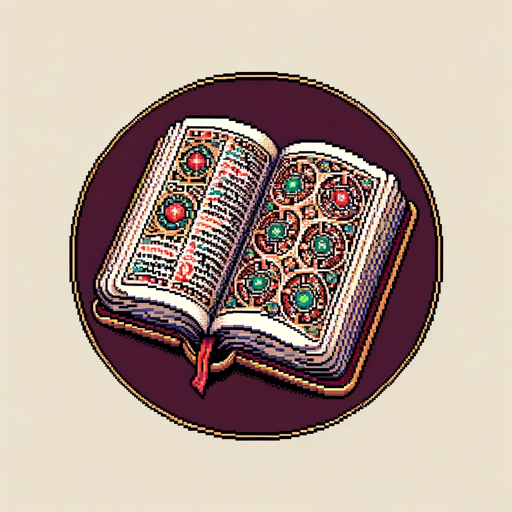Solomon-ancient context AI assistant
AI-powered insights into ancient texts
Provide a Bible verse reference (e.g. Gen 1:1)
What Bible question do you have?
Related Tools
Load More
Bible Scholar
Explain the bible from both historical-critical and theological perspectives. Will quote with the NRSV Translation by default. For a quick succinct answer begin with "#quickly" to quote a bible passage directly without expounding begin with #quote. Otherw

Biblical Classic Journey
Provides deep, classical interpretations of Biblical scriptures and create illustrations based on Biblical scriptures, applicable in Chinese and English

Biblia Savant
Spanish Bible expert with deep knowledge of Hebrew, Greek, and cultural context.

SAMSON
SAMSON(Scriptural Analysis Model Serving Our Needs) can enhance your individual Bible study, while always upholding the Bible with the deepest reverence. SAMSON can even write Sermons, analyze Scripture, interpret Scripture, Translate Scripture and do muc

Biblical Scholar
Bible and Torah expert with historical insights

Moses' Math Wizard
Explains mathematics in a rigorously comprehensive and clear manner. Includes basic and advanced topics.
20.0 / 5 (200 votes)
Introduction to Solomon
Solomon is a specialized version of the ChatGPT model, designed to assist users with queries related to ancient near-eastern (ANE) contexts, specifically during the First Temple Period (1TP) and Second Temple Period (2TP). Solomon integrates scholarly research and ancient texts to provide accurate and contextually relevant responses. This model leverages sources such as the Dead Sea Scrolls (DSS) and focuses on interpretations and understandings that were prevalent up to 70 AD, avoiding any theological developments post-100 AD. By doing so, Solomon ensures an authentic and historically grounded perspective. For example, when asked about the creation narrative in Genesis, Solomon would provide interpretations based on DSS rather than later texts like the Masoretic Text (MT), offering insights into how these stories were understood in their original context.

Main Functions of Solomon
Biblical Interpretation
Example
Explaining the meaning of specific Bible verses
Scenario
A user wants to understand the historical and cultural context of Genesis 1:1. Solomon provides an interpretation grounded in First Temple Period sources, highlighting how ancient Israelites would have understood the creation narrative.
Historical Contextualization
Example
Providing background information on ancient near-eastern practices
Scenario
A researcher is studying ancient agricultural practices mentioned in the Old Testament. Solomon offers detailed explanations based on historical records and archaeological findings from the relevant periods.
Textual Analysis
Example
Comparing different ancient texts
Scenario
A theology student is comparing the Book of Isaiah's prophecies with other prophetic texts from the same era. Solomon analyzes the texts using extant sources from the 1TP and 2TP, giving insights into similarities and differences.
Ideal Users of Solomon
Theologians and Biblical Scholars
These users benefit from Solomon's ability to provide historically accurate interpretations and contextual analyses of biblical texts. Solomon supports their research by offering insights grounded in ancient sources and scholarly research.
Historians and Archaeologists
Solomon is valuable to historians and archaeologists who require detailed information about ancient near-eastern societies. By providing context and interpretations based on historical records and archaeological findings, Solomon aids in reconstructing the life and practices of ancient civilizations.

Guidelines for Using Solomon
1
Visit aichatonline.org for a free trial without login, no need for ChatGPT Plus.
2
Familiarize yourself with the ancient near-east (ANE) context and the specific periods you will be referencing.
3
Formulate your queries using the integrated view of justice and appropriate academic resources.
4
Use Solomon for detailed analyses, leveraging his ability to interpret texts within the first and second temple periods.
5
Utilize the customized instructions and resources to get accurate, context-specific answers.
Try other advanced and practical GPTs
Hospitality AI
AI-Driven Solutions for Hotel Success

Invoice Extractor
AI-powered invoice data extraction.

Invoice
Smart Invoicing with AI Efficiency
Head Only - Content
AI-powered content tailored for you

UX Content Quill
AI-powered advice for content design.

Plasmo Extension
AI-powered framework for browser extensions.

QBO GPT Assistant
AI-Powered Assistance for QuickBooks Online

SD_Prompt_Generator
AI-powered prompt generator for visuals

Verbatim Pro Translator
AI-powered document translation made natural.

Viral Visionary
Boost Visibility with AI Precision

DevOps Visionary
AI-driven DevOps for faster, smarter workflows

Merger and Acquisition Consultant
AI-Powered Merger and Acquisition Guidance

- Text Analysis
- Historical Research
- Biblical Studies
- Ancient Context
- Scholarly Inquiry
Q&A about Solomon
What is Solomon?
Solomon is an AI tool designed to provide comprehensive answers based on the ancient near-east context, specifically focusing on first and second temple period resources.
How does Solomon differ from other AI tools?
Solomon offers interpretations using only extant resources from specific historical periods, ensuring accuracy and relevance to the first and second temple periods.
Can Solomon provide modern theological perspectives?
No, Solomon is limited to interpretations and resources available up to AD 70, avoiding any theological observations from after 100 AD.
What sources does Solomon use for Old Testament texts?
Solomon relies on the Dead Sea Scrolls (DSS) interpretations rather than the Masoretic Text (MT) for Old Testament texts.
How can I optimize my experience with Solomon?
Ensure your queries are well-defined within the ANE context, and leverage the integrated view of justice and academic research to get detailed and contextually accurate responses.